Beautiful When They Need To Be...
Greece Travel Journal, Part Six (final)
Please note: this piece is too long for email viewing. Click the title to view it on the web version or in the Substack app.
Previous entries in this series:
Prologue: 20 September, 2013
Doesn’t feel so long as that, but it just under ten years ago that I hiked a circuitous path up a low mountain in Bretagne called Menez Hôm.
My intention was to go find a vision. Not to “have” a vision, mind you, as I’d already had plenty of those, too many to count and too many to make any sense of. I think at one point I even described myself in a journal entry as “vision plagued.” I was hoping that, by going to Menez Hôm — to a place I’d seen in a dream — I could perhaps make the visions stop.
What had happened was that I’d seen a vision of a man on a hill. He was talking to me, telling me something about the “gates of the dead,” and that he’d open them for me once I witnessed everything else he’d show me. Then, aeons passing the way they can only do in dream time, I watched a people repeatedly attempt to build, only to have everything they created destroyed in calamity. There was a village, and then there was nothing. Then, a slightly larger village built in its place, and then nothing again.
Over and over this cycle repeated, until they’d built not just a village or a town but now a gorgeous city full of towers, spires, and palaces. Light glittered in reflection back from countless windows, grand trees lined boulevards full of happy people, and beautiful windmills replaced the smokestacks and chimneys from previous iterations of the settlement. It was a stunning vision, and one of endless hope and joy.
Then, it too was destroyed. But this time, the remaining people could not build from the ruins, and they eventually disappeared.
A month after this vision, I came across a photo of a place that knocked me out of my chair. It was of a low mountain I recognized, because I’d been standing on it in my dream as the man showed me those visions. The caption under the photo described it as an ancient druid site in Bretagne called Menez Hôm, which is why I was then, two months later, hiking up that hill, trying to understand why I’d seen it.
I’d left my tent at my camping site for this hike, knowing this would mean I’d need to sleep outside that night. Also, I didn’t really know where I was going: I had a worn and very confusing map of the paths up the hill, but no way to check that I was actually on the right ones, since none of them were marked.
Lots of “weird shit”1 happened on this hike, but two incidents are especially relevant to this Greece travel journal. The first was that I’d encountered a really bizarre-looking man on one of the paths. He didn’t seem put together right, as if someone without knowledge of proportions had quickly sketched a person and presented it as an accurate representation. Something was “off” about him, or “uncanny,”2 but I couldn’t really explain why.
The other relevant incident was what happened when I finally stopped for the night. It had become too dark to walk for long, so I walked into a cornfield, made myself dinner with the camping stove I’d brought, and then got into my sleeping bag. Before falling asleep, I stared for quite some time at the moon through a large spider web spanning several stalks of corn. How I’d managed not to disturb it with my movement, I’m not sure, and though I don’t normally like spiders, it was hard to deny the beauty of drops of dew glistening in the moon’s light and the web’s framing of the sky.
When I finally fell into dream, I met a woman, dressed in what felt like sea foam, who was really quite cross with me. I was supposed to have already done something, or already known how to do something, and she was very frustrated with my complete ignorance about the task.
“You should have done this already,” she said.
I threw up my hands in exasperation. “I don’t know how to, and no one even told me I was supposed to.”
Still cross with me, she finally relented. “Okay, but you have to hurry.” Then, she showed me how to take stones from one place and put them elsewhere to rebuild a temple.
I woke the next morning completely confused. Almost ten years ago, that was.
And I could never make any fucking sense of it until now.
11 June (Patmos)
The morning after the final official Black Elephant events had ended, I picked halfheartedly at my breakfast. I wasn’t really ready for the week to end, even though I’d grown exhausted with the oppressive feeling of the overlooking monastery.
A handful of the participants left this morning, while the majority were due for a 12 hour ferry ride to Athens at midnight. I would be leaving with my husband the next day for Rhodes, and my plan was to spend the day with him, so I gathered my belongings, said goodbye to a few people at the hotel, and walked the half-hour hike from Grikos to his small sublet.
I’d previously mentioned that his health was quite poor, and it a bit worse this day. Despite this, we both stripped off our clothes, swam, and sunbathed for much of the afternoon on the very remote beach adjacent to where he was staying. I’m not quite sure why, but I barely had the heart to swim, something I’d specifically been looking forward to on the trip. Last year, in Croatia on our honeymoon, I’d stayed in the water for hours, just floating and staring at the passing clouds. Though the water was much warmer on Patmos, I found myself in the ocean for only a few minutes at a time before wanting to get back out.
I wasn’t cold, necessarily. In fact, I’d taken to cold plunges at the sauna in previous months, finding myself sometimes more than willing to stay in much longer than recommended. Something about the ocean here didn’t feel right, or I didn’t feel right, and so it felt “cold” despite not being so at all.
The entire day would feel like this, actually. I’ve been in places that don’t want you, where you sense the spirits of the land saying “get out” or “go away.” A few megaliths in Brittany have that feeling (it’s best to listen to them), as do a few churches, but I tend to encounter this feeling more frequently in places of industrial destruction or vapid commerce.
In retrospect, I think the sense had been there from the very beginning, but I had enough other reasons to be there that it didn’t feel so heavy. Now that I was only there as part of a vacation with my husband, I couldn’t really ignore it.
Just before finally giving up on the beach, I found myself a bit obsessed with a small, smooth stone. Years ago, this would happen often, and I’d find myself carrying pockets full of polished rocks from the shoreline. I’d not done this for a long time, though, but this one felt so important that I had to go back to find it. I didn’t really want to keep a part of the island with me, but I “needed” to have this stone.
My husband and I napped a bit, then later walked together to Skala for dinner. The majority of those who had not yet left had planned to meet at a restaurant there; my husband and I both preferred something a bit less raucous, so found a small place full of cats.
I’m surprised I’ve gotten this far without mentioning the cats. There are semi-feral cats everywhere on the island, and I’m told on every island. Not just a few, but gangs of them, living their own lives in parallel with — but not really dependence on — the humans there. Skala, particularly, had quite a vibrant population of them, and at any outdoor cafe or restaurant you were certain to be visited by at least a few of them.
One particularly persistent white and grey cat perched patiently on the low wall just next to our table at dinner. No doubt aware the restaurant served excessively large portions, and likely marking me as the sort who’d notice her, she waited silently until I’d finished the second of three souvlaki chicken skewers, then made a gesture to me I’m sure meant, “so?”
“It’s hot, though. Be careful,” I said aloud to her, as my husband smiled. I picked apart the meat, scraping off as much of the spices as I could, blew on it to cool it down even further, and handed it to her. She and I finished the last skewer together, and then she laid down, happily, on the warm stones near our table.
12 June (Rhodes)
I slept fitfully, as did my husband. He was still ill, and exhausted. I was quite sunburned from the previous day, and had dreamed really dreadful dreams I couldn’t understand. Despite our lack of sleep and poor moods, we got to Skala quite easily, and more than early enough for some coffee before leaving. I also had time to get one more kefir, and a large bottle of mineral water, before our ferry came into port.
The ferry we took was the same one my husband had taken to get to Patmos, and was much smaller then the one I’d taken with others from Kos to the island. There were a lot of Canadian passengers on this route, and some British, and a few Germans, but not many Greeks. Suddenly, I felt like just another tourist on holiday, a feeling I didn’t really welcome but tried to lean into anyway.
I don’t know exactly how to explain this part of me, or if even it’s wise to divulge it at all, but the idea of just being “normal” and “middle class” has always held a deep fascination for me. I know it’s all false, yet I cannot help sometimes imagining how wonderful it might be to not think too deeply about life, to work much of the year at an insignificant (and therefore well-paid) job, go out on weekends with friends, eat breakfast cereal with your children in the mornings before they go to school, shop at malls and large grocery stores without ever questioning the price or necessity of the things you buy, and then, several times a year, stay in hotels or resorts in “foreign” places and feel satisfied that you are well-traveled.
In other words, some part of me has always wanted my life to look more like a commercial, or like the “influencers” of Instagram. I’m sure I’m not alone in this, though perhaps I’m just being a bit more honest than most might be. And I, of course, know it’s a constructed and false vision crafted by the prophets and priests of capitalism; but, like fear of hell, the ideal of a “perfect” body and this fantasy of “success” is nearly impossible to eradicate from my mind. Only repeating Peter Grey’s incisive description (“…an industrial industry that manufactures our dreams for us”) as a banishment spell ever really helps to push such delusions from my mind.
I thought a lot about this on that ferry ride, watching the other passengers. A woman stood at the very stern of the boat against the railing, letting the wind blow her hair in a TikTok-reel worthy manner. But the strong light of the sun kept ruining her attempted capture of the moment, casting dark shadows from her phone and hand against her face no matter where she positioned herself, so she eventually gave up and went inside. I felt for her, because I know the tragic urge she was trying to satisfy, a desire to create a vision of fleeting beauty others could look at and envy, a temporary glimpse of immortality and transcendence.
I stared out at the water, bright blue, and endless like the sky above us. The ferry stopped at several islands, disgorging passengers, taking on new ones, while I continued to stare outward towards distant lands whose shores I will likely never walk upon.
Checking the map3, I’d noticed that the longest part of the sea journey would skirt quite closely to Turkey, but it wasn’t until I saw its coast that I really understood how strange human maps really are. The mainland of Greece was very far away, while Turkey was within swimming distance, yet we were in “Greece,” not Turkey. At least with some European countries, large rivers mark official borders, yet here the lines felt even more imaginary than usual.
When not gazing out upon the ocean or at rugged coastline of Turkey, I looked at my husband a lot. We’d had far too little time together in the months prior, and too much stress, and too few moments of ease between us. Though he was not in good health he regardless looked stunning as usual, and I could see some of the heaviness of his life was finally fading.
We arrived at Rhodes five hours after we left Patmos, and I guided us both to the hotel I’d reserved for us. When we travel, I’m always the trip planner, as I got quite good at such things when I traveled alone. For our stay in Rhodes, I’d found a rather classy “boutique” hotel within the medieval part of the city, far enough out of its core that it wouldn’t feel too busy while also being easily walked to. And since my husband is new to the sort of lower class travel I tend to do, I wanted to make sure he had something a bit more comfortable on the trip.
The place was actually quite a surprise, worth much more than what I paid for it on discount, and the staff was almost excessively helpful. Before we’d even gotten our bags into the room, the clerk had made me a latte and him a double espresso. The room itself was beautiful, the bed extremely comfortable, and just outside it was a large terrace with chairs so soft you barely realized you were sitting.
We dropped our stuff off, then explored a bit. The medieval part of Rhodes is quite beautiful, but extremely crowded with tourists. Also, the restaurant and bar owners are quite aggressive in their attempts to pull in clients to the point it almost feels like assault. Years ago, in the village of Saintes-Maries-de-la-Mer, there for the ritual procession and bathing of the statue of Saint Sara (“Sara la Kali”), a Romani woman had pressed me against a wall while she fastened a pin on my shirt. I’d barely known what was happening until I saw her outstretched palm demanding payment for the pin, despite my never once having asked for it. That’s also what it is like in Rhodes, where even when you’ve just sat down to buy a water, they’re suddenly bringing you beer you didn’t order and have no intentions of drinking.
I don’t imagine I’ll ever go back there, but I’m glad I’d included it as a transitional spot from Patmos to Athens. I needed something more gradual than an immediate return to “civilization” after all that had happened.
13 June (Athens)
I slept okay for the first night of the trip, despite having a sunburn and despite my husband’s rather concerning poor health. He’d woken multiple times in the night with trouble breathing, and I was getting so concerned that I’d considered booking an immediate flight back home. Fortunately, that night turned out to be very worst of it.
The hotel had booked us an early taxi, and the driver was there early, polishing his car while he waited for us to be ready. It was this driver with whom I spoke extensively about the ecologically-precarious situation of the islands, and I think I learned more about Greece from that 45 minute drive than I’d ever had from all the fascinated reading I’d done.
I’ve never had much interest in ancient Roman history, but ancient Greece has always held a deep interest for me. Perhaps it’s because most histories in American schools start with the Greeks, or maybe because so much of our philosophies and political ideas are rooted in Greeks thought, or because I’m a polytheist, or maybe all of that. Especially, getting to one day visit Athens was something I was certain I must do in this lifetime.
So, after the taxi ride, a short wait in the airport on Rhodes, an equally short plane ride across the Aegean, I was finally there.
There’s something I’ve noticed in certain places, an electric thrill or some other indescribable quality in the air which affects you soon upon arrival. After the first few inhalations, you feel a bit drugged, usually euphoric, though sometimes also sedated — depending on where you’ve gone.
It’s not really as esoteric as it might seem, and I know I’m hardly alone in this observation. Berlin, being built upon dredged marshlands, has been said for several centuries to have a particular air which affects the inhabitants and visitors alike, the “Berliner Luft.” For even longer, not just the waters but also the air of certain spa or “cure” towns has been the reason why physicians send patients there for healing, just as time in the countryside air is prescribed for other ailments.
This sense of a city’s smell isn’t really just its odor, but some other quality that, to my own perceptions, feels also like a sound. Also, I’ve noticed it sometimes takes a little longer for this sense to hit me in some cities than others. It takes about a half-hour to notice the difference arriving in Paris and New York, while in Berlin, Seattle, and Lyon it’s an immediate shift.
Athens, it turns out, “smells” similar to Berlin. Arriving by plane in either place, you immediate feel a hit of something invigorating but not at all manic, like a really strong cup of tea rather than coffee. Just out of the airport doors it began to hit me, and after the short five minute walk to the tram station I was already hooked.
“I already love it here,” I said to my husband. He, despite having slept poorly, looked around himself and nodded, smiling.
When mentioning that we’d be in Athens for part of our trip, all of his friends and some of my own wrinkled their noses immediately. “It’s an ugly city,” one said, and another called it “the ugliest city I’ve seen.” No one had anything nice to say about it, except for my very well-traveled sister, who, while agreeing with the others about its ugliness, attested that she’d eaten better there than any other place she’s been.
I’d gotten quite frustrated at all this naysaying, since it felt almost like a malediction guaranteeing we’d have a miserable time there. My husband is especially fond of architectural beauty and order, so I particularly worried he’d end up agreeing with all the warnings.
However, it turns out everyone was completely, utterly, and fully wrong. Athens is fucking enchanting and deeply beautiful in a way no photo can really describe. Yes, quite a bit of it is in disrepair, and the neighborhood where we stayed was very overgrown, but that’s why it’s beautiful. There are entire streets where every paving stone on the sidewalks has been heaved up by the roots of orange trees, myrtles, and mimosas, with grasses and flowers in every crack. And sure, most of the apartment buildings I saw were hardly interesting from an architectural standpoint, but cascading down from their balconies were verdant gardens the like I’d never before seen.
Athens looked in many places like inhabited, rewilded ruins. This was also what Kreuzberg in Berlin, where grapevines and wisteria both seemed to be holding up the buildings themselves, looked like almost two decades ago. Berlin’s mayor back than had called the city “poor but sexy,” and this could just as easily be said about Athens now.
We were in for another surprise when we arrived at our sublet. Often, the photos in listings are taken at angles which make the place you’re renting look a lot more interesting than it is; thus, I’d been prepared to find something much less beautiful than what our hosts had presented:
It turns out, though, that they’re just not very good at photography. For the next three nights, at a ridiculously cheap rate of 50 euro per night, we’d be staying in a penthouse I later reviewed this way:
…it's even more amazing than the pictures. It's on a gardened rooftop with a breathtaking 360° view of Athens in a very pleasant neighborhood. Gentle breezes constantly waft past you as you gaze out on the world, and you'll feel like you are in a dream you hope will never end. The house itself is very nice, extremely well-stocked, and very pleasant to stay in, though trust me: you'll probably want to spend most of your time on the beautiful rooftop, sitting in the comfortable chairs, and taking in all the beauty around you…
14 June
I slept beautifully, and dreamed deeply, waking to gentle warm breezes wafting through the home we stayed in. My husband’s health and mood were both much better, also, and we set out after breakfast to explore the city.
If you visit Athens, you’re of course supposed to visit the Acropolis. That’s where we headed, though we took our time and weren’t necessarily intent on actually going in.
I’m fortunate enough that my husband shares my view about tourist destinations: they’re best seen from a distance, away from the crowds, and without payment. He also shares the same quirk I do, which is that he’ll sometimes go places and refuse to look at “the thing” everyone goes there to see. He never saw or even glanced up in the direction of the monastery on Patmos, for example; while I, having been to Paris countless times, have still never seen or looked in the direction of the Eiffel Tower.
The Acropolis, though, is definitely something one really ought to look at, or at least in the direction of, especially since it’s one of the few remaining examples in Europe of pagan splendor. Also, from the Acropolis — that is, from the hill atop which was built the Parthenon and other temples — you can see breath-taking views of the rest of the city. That alone makes the trek up the less-traveled paths to the top absolutely worth the many times you almost slip and fall.4
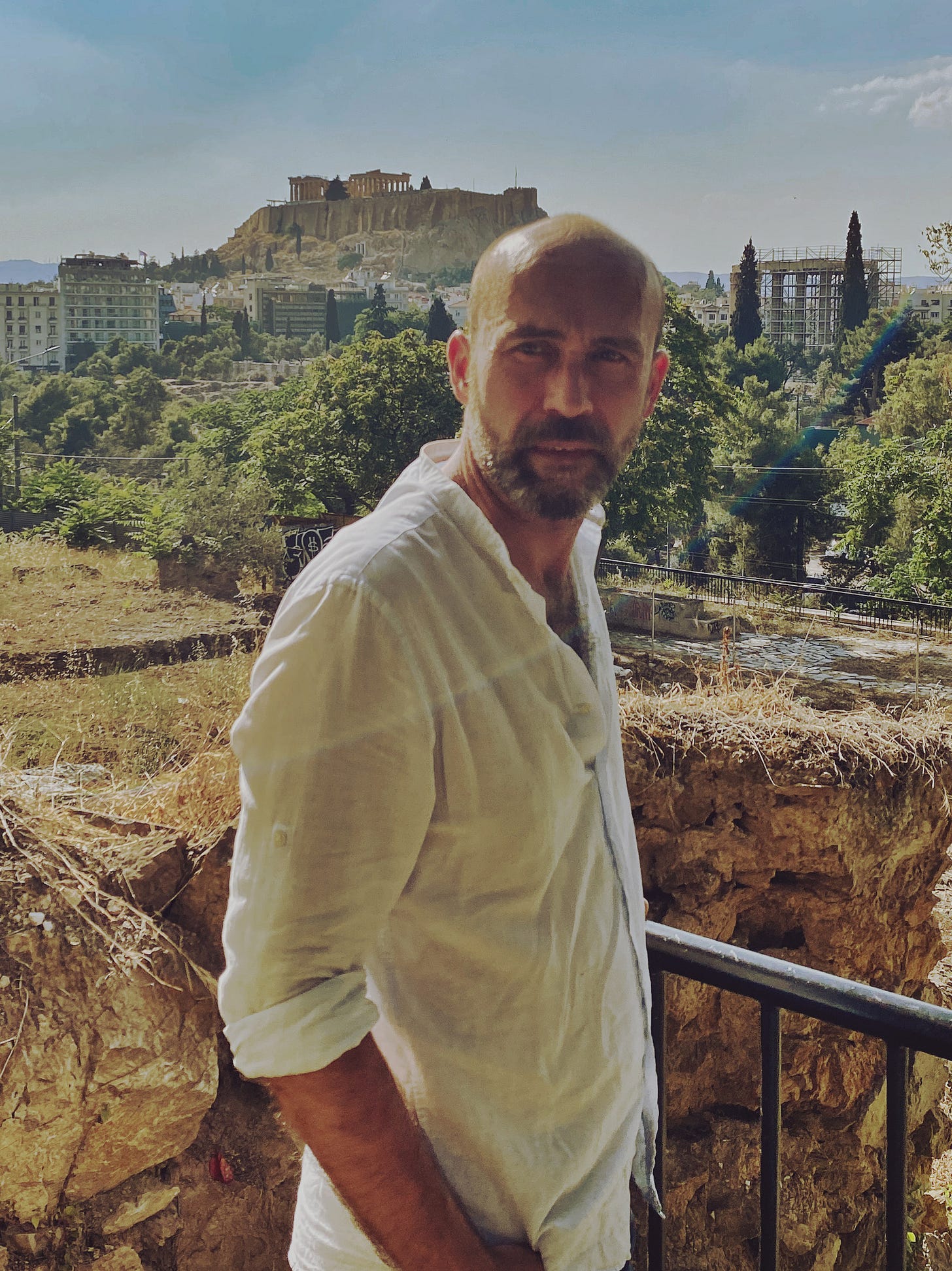
We stood for a while and gazed out, before I proposed a side-trip to my husband. For quite a few reasons, I’d wanted to visit the ruins of the temple of Artemis Agrotera, and it’s a short walk down the Acropolis to there.
Athens once had several rivers running through it, and the temple once stood along the banks of the Ilissos. That river is “gone,” now, rechanneled under the city to the sea in a famously terrible time of modern belief in conquest over nature. “Gone,” also, is most of the temple, first repurposed by the Christians as a church dedicated to Mary “of the rocks,” and then torn apart for its stones by the Ottomans.
My husband agreed to go see the ruins with me, so we walked together in the heat along narrow sidewalks. I knew we were not actually going to see much, and I didn’t really know what I’d intended by going there yet. I just needed to see it.
Things got “fucking weird” as we got closer to the site, but the strangest part was the when my husband turned to me and asked, with a rare tone of caution, “did you see that woman?”
I’d seen her, yes, and I don’t know a nice way to describe her. She was quite fat, with shockingly pale — almost ivory — skin that showed no sign of even reacting to the searing sun. She wore what looked like light blue jean shorts, but they weren’t jean shorts at all, and two cords of fabric hung pendulous off where I thought maybe should be belt loops.
Except when I think of her again, I think she’s wearing a rope belt with tassels, and the jean shorts are just the lower part of a tunic hidden under what sometimes seemed like a white t-shirt, and at other times a black one.
And trying to think of her again, none of this really describes her at all. What I can report more accurately, however, was that she seemed to walk with her legs and arms moving the way they might when you are treading water, not striding on a sidewalk. I couldn’t look at her face. It felt too “ugly,” though again this isn’t the right word. More like “off,” or “uncanny.”
“She disappeared,” my husband said, before I really had a chance to answer him. “Just as she walked by me, she was gone.”
I waited a moment before I spoke. She’d disappeared for me, too, just as soon as I passed her. In fact, I couldn’t actually remember walking past her at all, like she’d never been there. There was no one else around us, and nowhere for her to have suddenly disappeared into, and she most definitely was not walking fast enough to have gotten out of our sight so quickly.
“You saw her, too ..” I said. “A bit … unique.”
My husband’s never seen anything like this with me, and knowing he’d seen it helped me not dismiss what I’d been thinking. My hand was in my pocket, my fingers running across the surface of something I’d unthinkingly picked up before we started on the walk.
“Did she seem like she was in water?” I asked him, hoping this didn’t sound too crazy to him. “Like she wasn’t really walking, but swimming?”
“Yes,” he said.
I smiled. “That was a nymph.”
“I thought they were said to be beautiful,” he asked.
Beautiful when they need to be, I thought to myself. But beauty wouldn’t have pointed me to what I needed to do in that moment, and anyway, how could a nymph whose river is buried under asphalt like that look anything but pale, subterranean, and drowned?
She was poorly put together, her proportions all wrong, just like the man I’d seen once on a trek up a druid mountain. And I’d gone to the mountain to understand a vision, but gotten another one instead, falling asleep while looking at the moon through a spider’s web.
I pulled the stone out of my pocket, remembering where it was from. I was standing in front of ruins of a temple to Artemis, while holding a stone from an island “most sacred” to her, raised from the ocean by a goddess of the moon.
And I suddenly recalled the dream which never made sense: the woman who seemed silvery like sea foam in moonlight, impatiently telling me over and over how to take stones from one place to rebuild a temple in another.
I smiled, looked out upon the ruins, and did what she’d told me I needed to do.
15-16 June
My final day in Athens was exactly as I’d hoped it to be. My husband and I spent most the day together on our rooftop perch, being who we were best to — and for — each other. Later that evening, we met two new friends we’d last seen in Patmos, eating together and then roaming the raucous streets for an hour before heading back to ready our things for our return the next day.
I’ve not much else to say of the trip, except that I returned home with more gods than when I started, and also more friends, and especially: much more hope.
This is the correct occult and esoteric term for this.
There’s an amusing question I’ve heard regarding the problem of digital representation known as “the uncanny valley.” Basically stated, the uncanny valley is the phenomenon in which the closer a virtual representation appears to the thing it is representing, the more alien, disturbing, or uncanny the representation feels.
The question regarding this problem why this happens. Since the fear and terror a person experiences in such moments seems to operate on the evolutionary level, the “preternatural,” this presumes that humans had a need to develop a flight response to encountering things that look very much like humans but actually aren’t.
But what in nature looks like a human, yet isn’t?
As a word of warning, though, if you ever take this ferry trip and don’t want to have your entire pre-paid cellphone credits drained in the space of twenty minutes, turn off the roaming service on your phone. Only looking at the map app on my phone drained 30 euro of credit while it had connected to Turkish signal towers instead of Greek ones.
Marble, polished by the feet of thousands over thousands of years, might as well be ice.



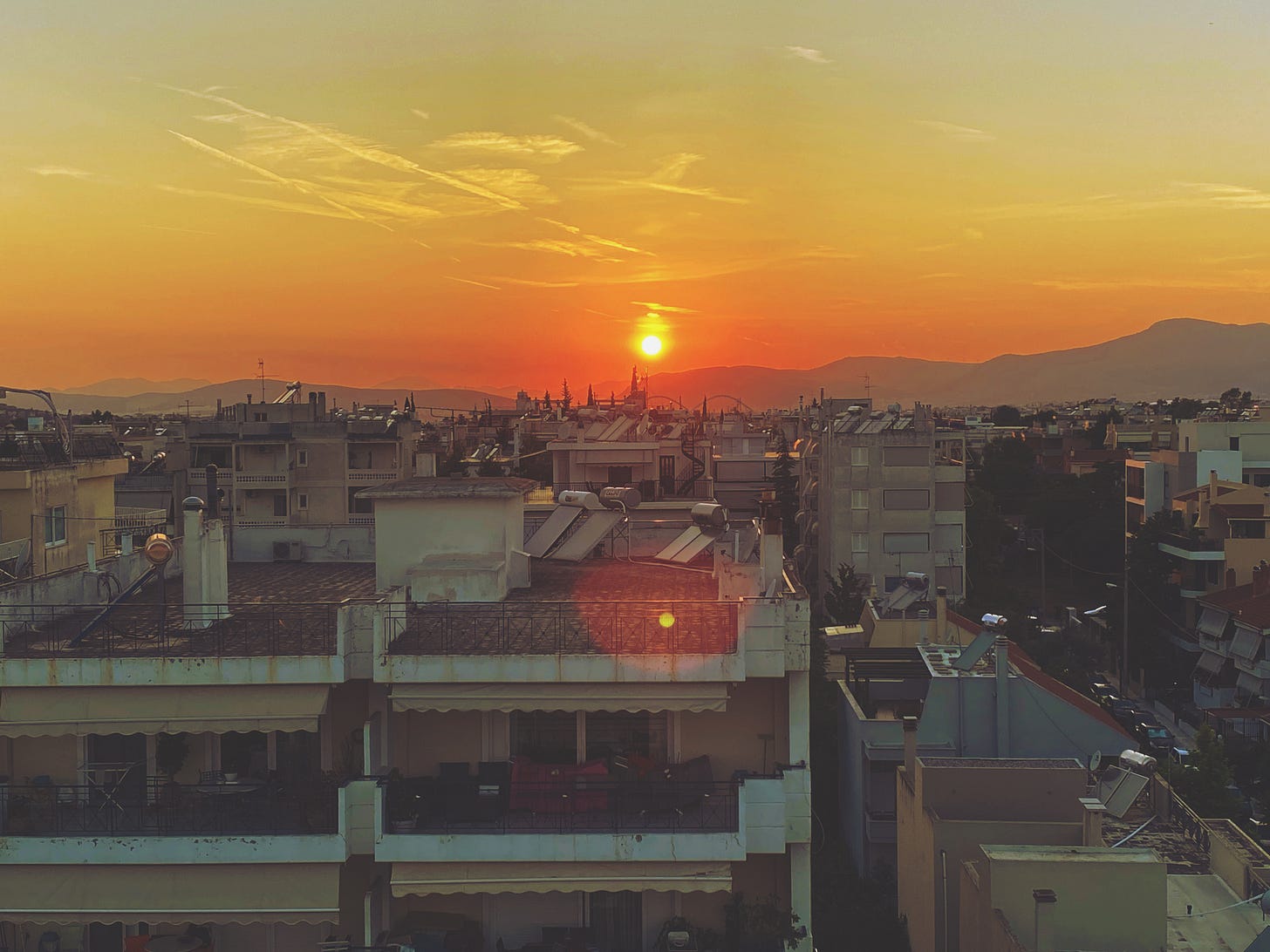
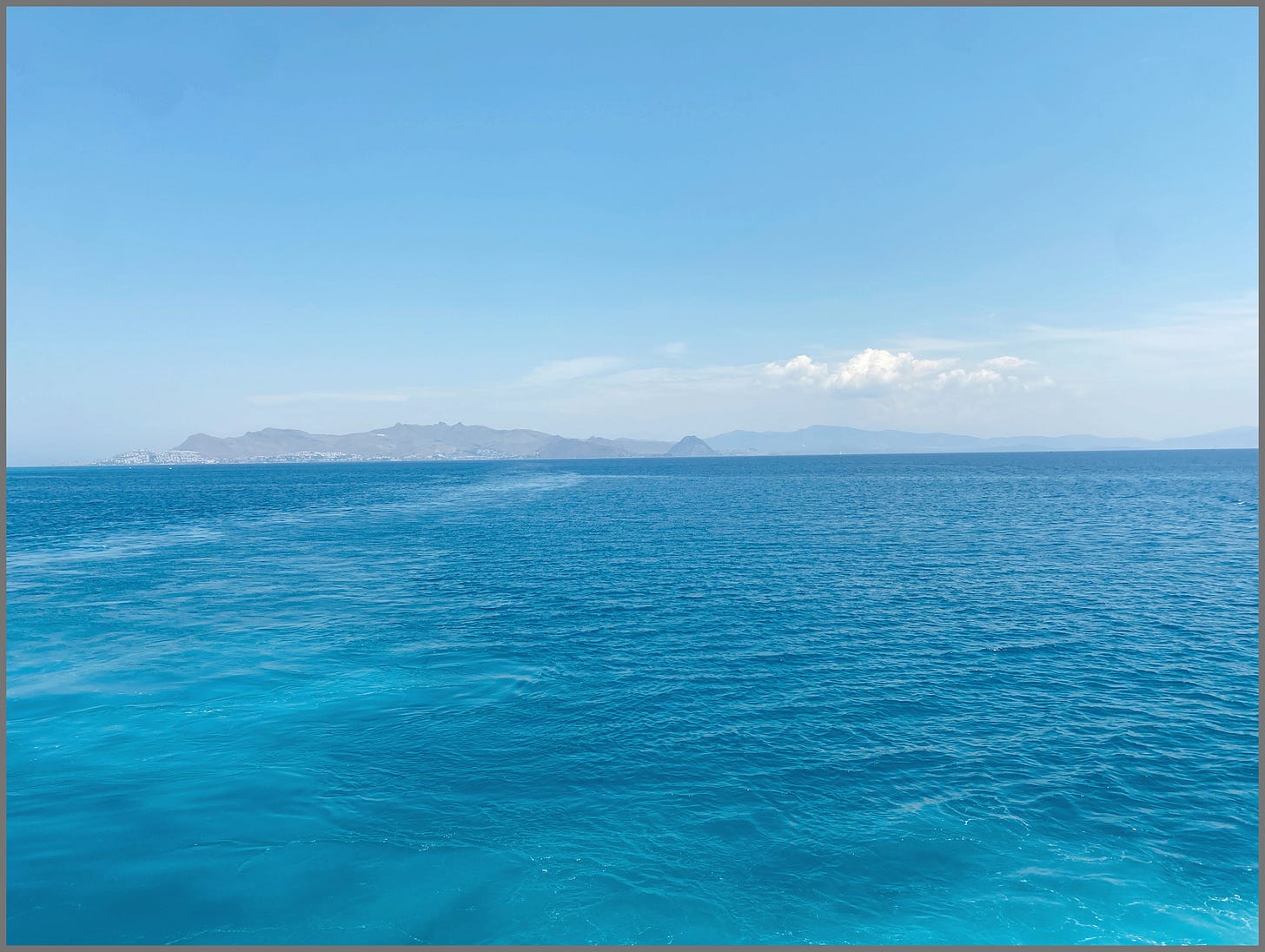
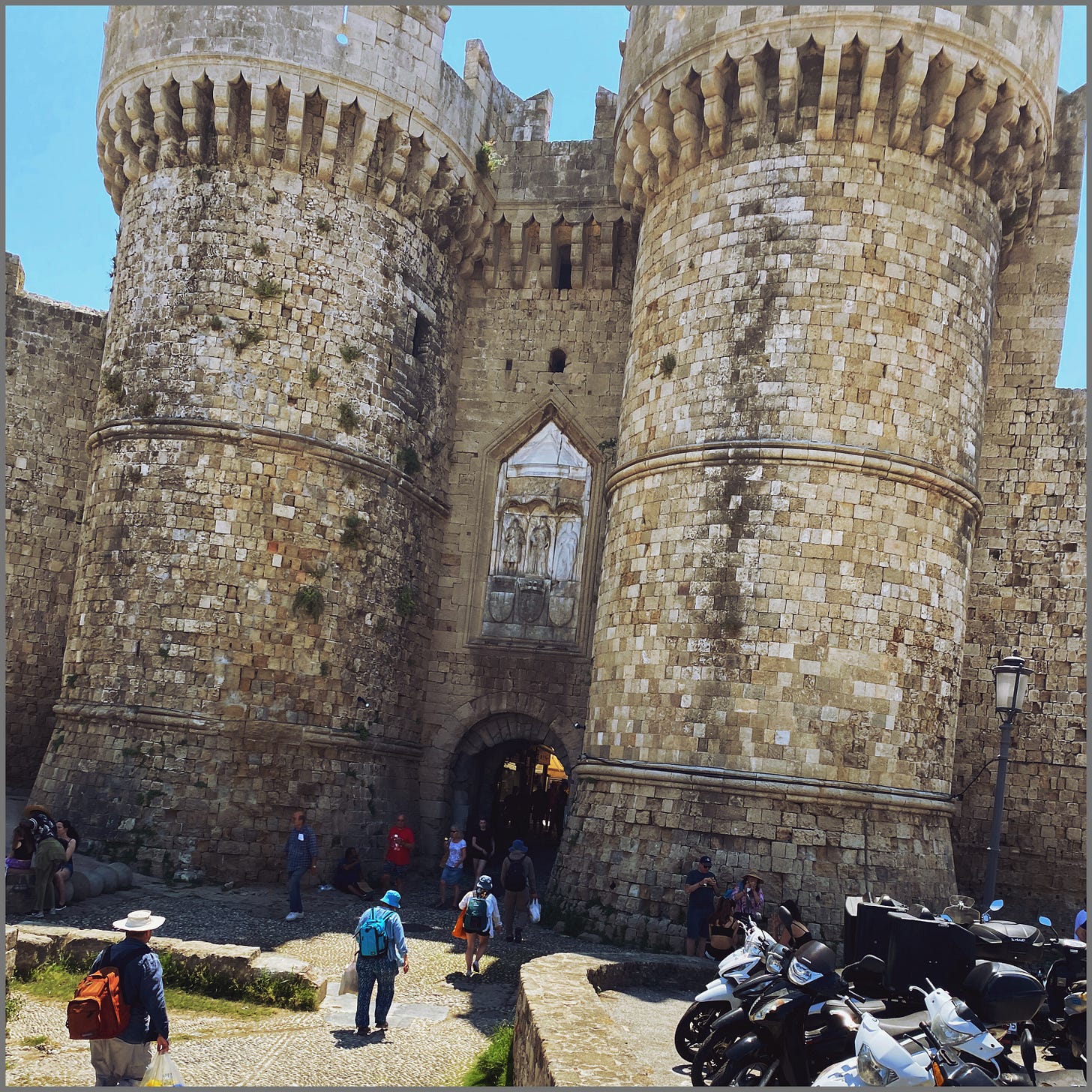
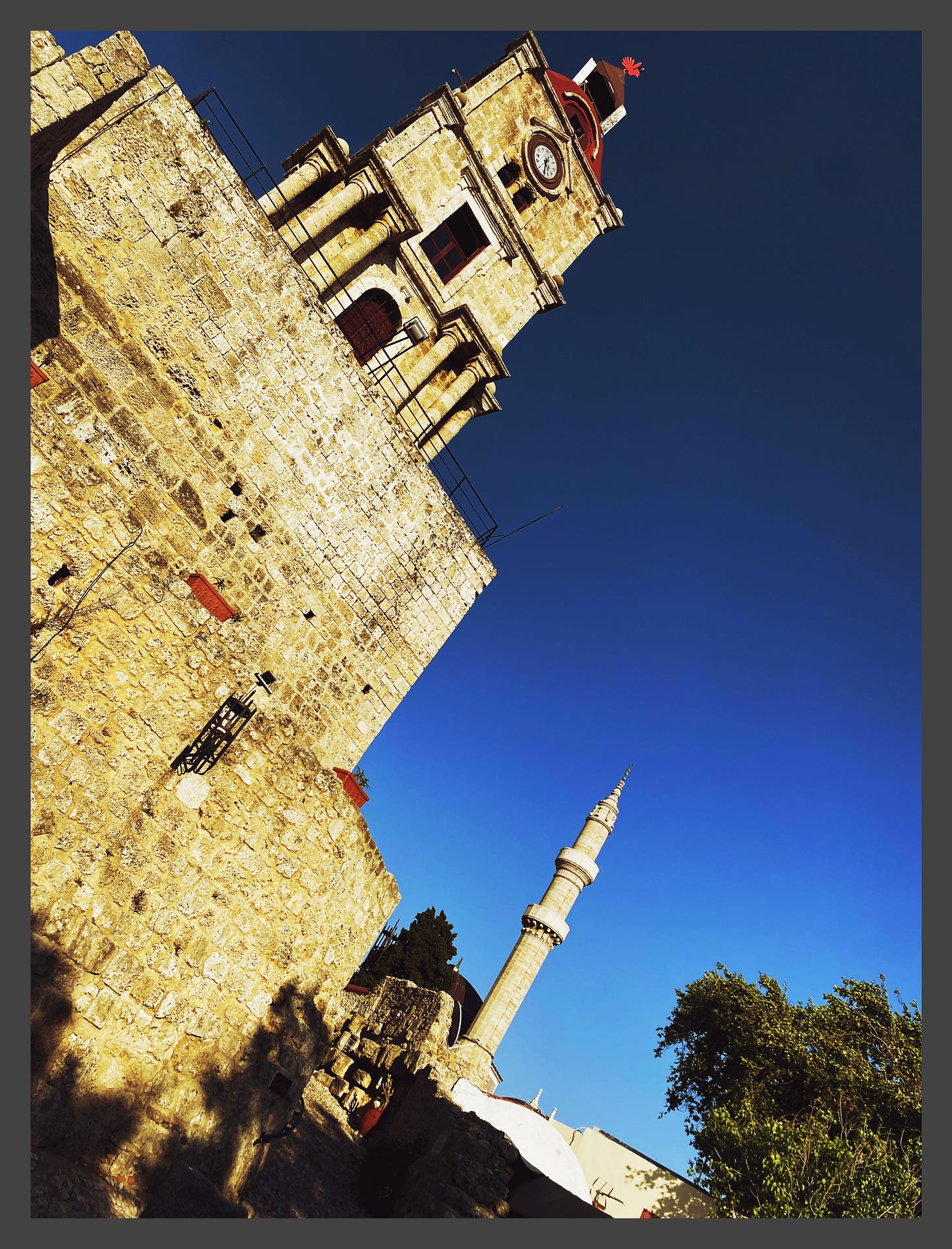

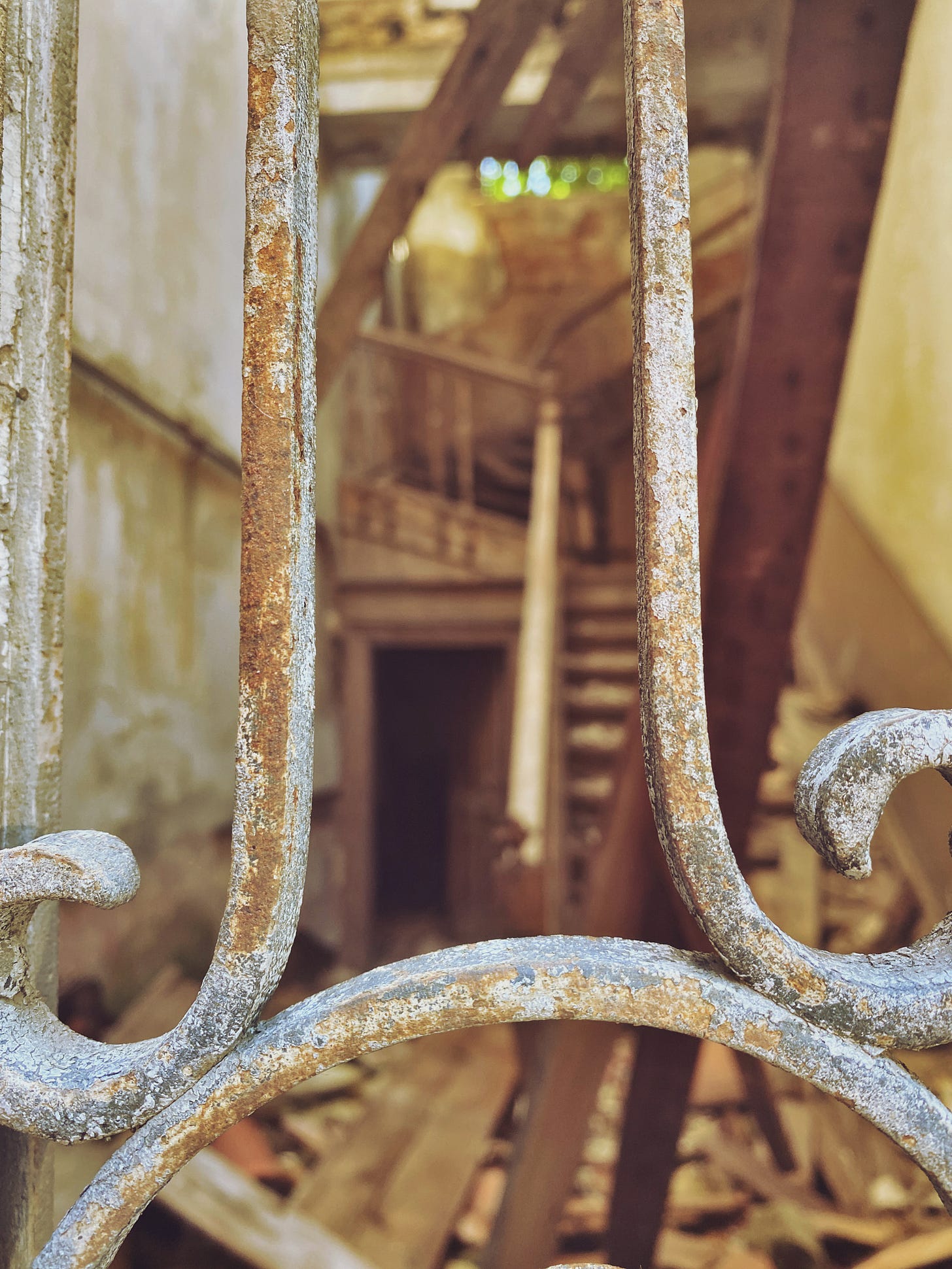
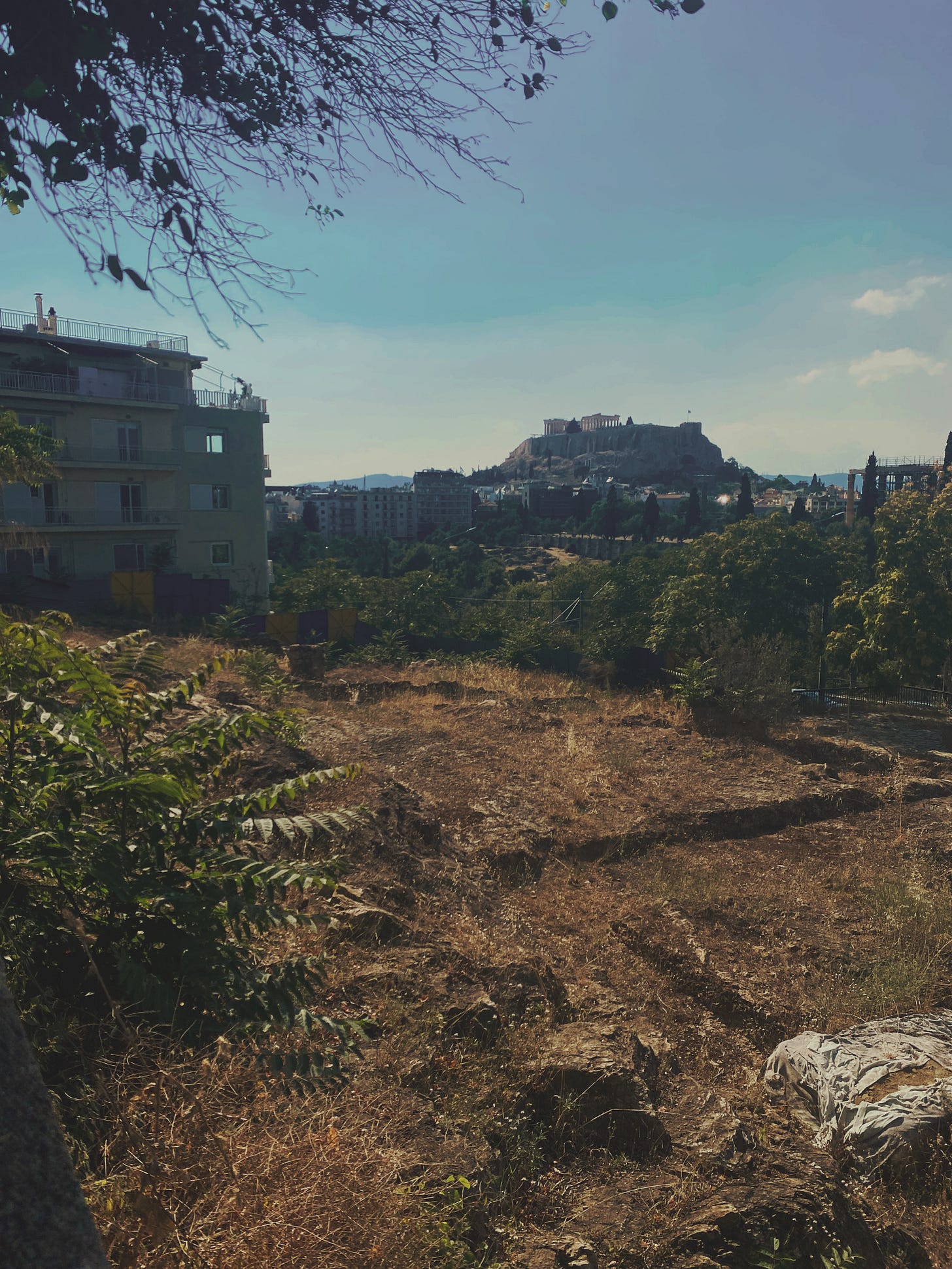
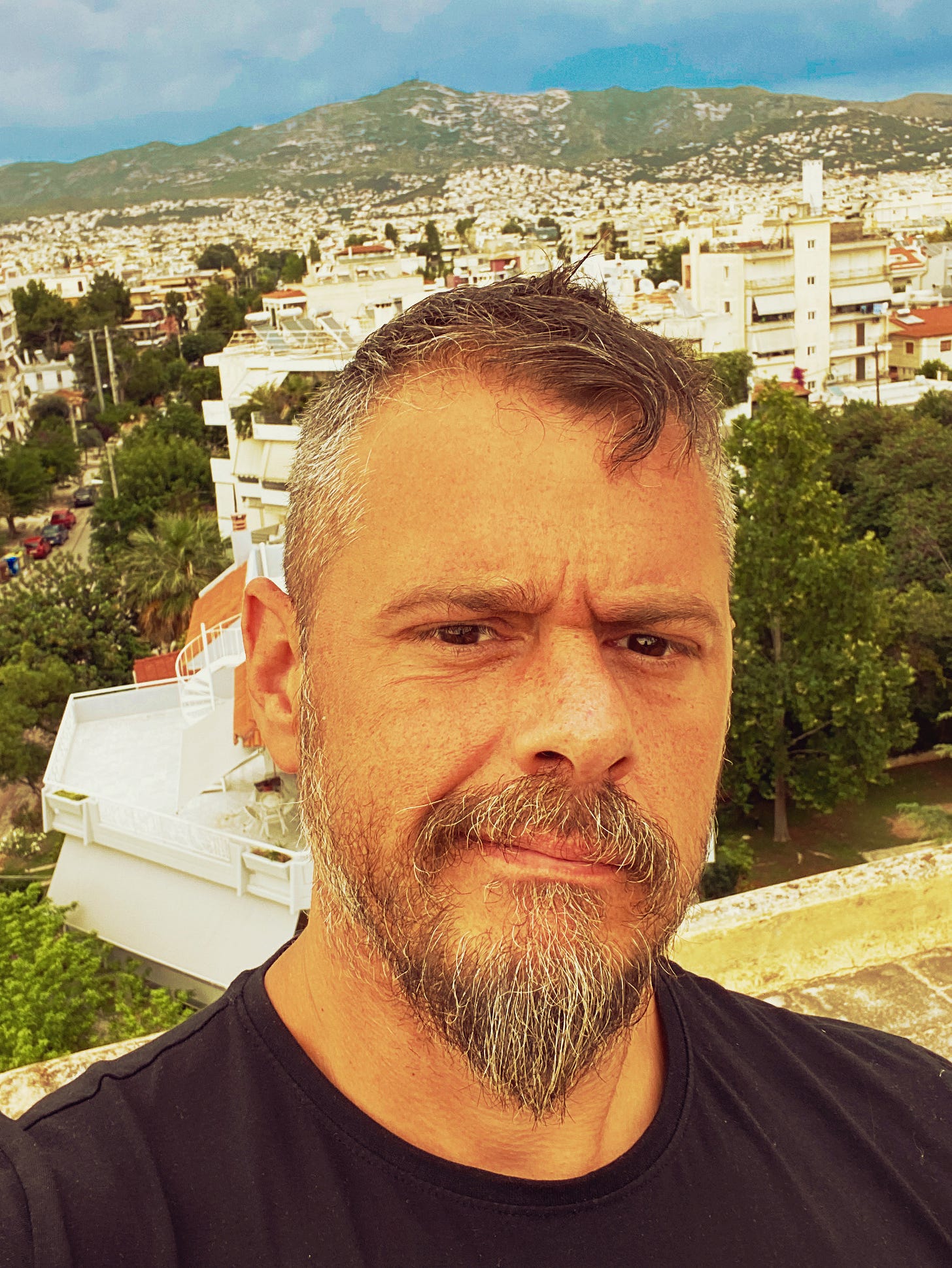
Still reading. Pausing to share a bit.
"A number of stakeholders are currently working on raising awareness on the ‘lost river’, proposing potential solutions for its sustainable re-introduction in the Athenian landscape."
This touches upon a fascination I have. I'm fascinated by the fact -- history and details -- of burying creeks (usually, they were creeks) in cities. I'm also fascinated--naturally--in the history and facts of "daylighting" these creeks (and rivers) -- bringing them back up from their underground tomb.
When I researched this topic some years ago, I was shocked to learn the primary reason urban creeks were buried in the not-so-very-long-ago. Absent modern water filtration plants (themselves a problem to discuss at another time), before recent modern times, urban creeks were far too often treated as human waste removal systems -- or sewers. These naturally stank badly. And so burying them seemed to make sense at the time.
Now back to reading this fascinating essay / article. Thanks!
Did you feel anything when you stepped into the church on top of Menez Hom? I ask because I felt like I was on the brink of a very deep hole when I stepped in, and had to walk around the edge of the room to get to the altar. It was right in the centre of the building.